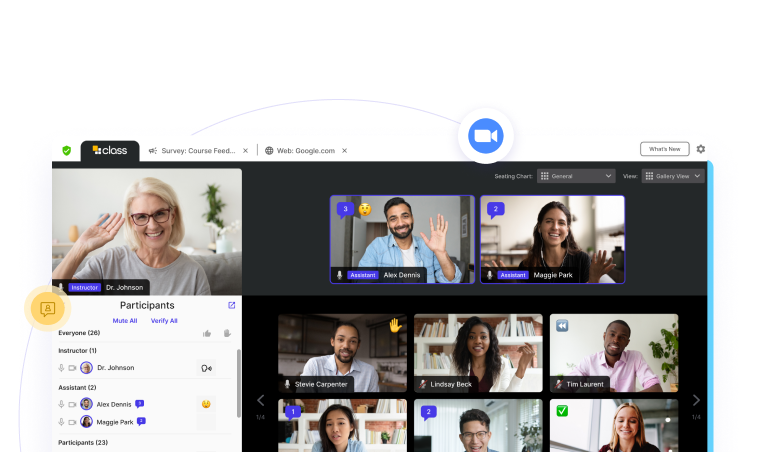
Mike Lovell is the SVP of Marketing at Class. He has dedicated his career to technology and the applications that can innovate the way people live and learn.

Mike Lovell is the SVP of Marketing at Class. He has dedicated his career to technology and the applications that can innovate the way people live and learn.

Artificial intelligence has rapidly shifted to front-and-center for most industries, from healthcare to business intelligence and more. As we explore the future of learning trends, it’s clear that AI will play a significant role. According to a recent Pew Research poll, 42% said they are equally excited and concerned about the changes in the “humans-plus-tech” evolution they expect to see by 2035.
As we explore the shifts occurring, an area of particular interest is artificial intelligence in education. Not limited to K-12 or higher education, but across the bandwidth of training, education, and learning across sectors, the growth of AI and classroom innovation has already begun to emerge.
As Serena Sacks-Mandel, CTO of Microsoft Education notes in a fireside chat with Class co-founder and CEO, Michael Chasen and Campus Computing Survey founder, Casey Green, “We are already seeing the impact of AI across multiple industries, including education. And it’s only in its beginning…I would argue…that the changes are already real and occurring.” With this as the backdrop, let’s explore four of the top AI trends developing.
As more and more of learning and development, training, and education move to a virtual classroom, next-level datasets are being unlocked that were previously unavailable for in-person environments. With the emergence of a higher caliber online learning platform, companies, institutions, and more have started tapping into the wealth of analytics that are tracked for virtual classroom sessions.
Now, with the abilities of artificial intelligence in education, organizations can identify trends, create predictive analyses, and better surface previously disparate data points to discover opportunities (as well as identify concerning shifts) in advance.
With demand for virtual classrooms continuing to skyrocket amongst learners—from meeting college students where they are to efficiently upskilling and reskilling a dispersed workforce—more reliance has been pushed on creating accurate, reliable, insightful resources as part of the education process.
With the introduction of AI, top-notch online learning platforms are now able to provide virtual assistants possessing real-world (and real-time) offerings. Whether creating study guides based on a lecture as it wraps up or getting an employee up-to-speed who is ten minutes late to an internal process and procedure meeting, virtual AI assistants are able to provide impactful resources based on an organization’s internal information to ensure accuracy and reliability.
In the fireside chat with Microsoft, Michael notes that, “AI takes it one step further…Not only is AI going to be used as a productivity tool for instructors and as an added part of how they can complete their assignments from the student perspective, but this is truly something that has the potential to even rewrite some of the rules for education and rewrite how education is delivered.”
Related: New To Class: Our ChatGPT-Powered AI Assistant
The ability to leverage AI is not only positioned to be a vital skill set for the workforce of tomorrow, it’s already having major impacts at present—making it a much-needed upskill for today’s labor force.
A 2023 Nielsen Norman Group meta-analysis of three major studies found that using AI tools in business improves users’ performance by 66%, averaged across those three studies. Perhaps even more impressively, this analysis found that performance efficiency actually increased for workers as the complexity of the task increased, highlighted by their finding of a 126% increase in productivity for programmers who used AI tools while coding.
Instructors—from educators in virtual classrooms to trainers for government agencies—can not only provide heightened resources to learners, but they can even tap into the use of AI to align training with company goals or to ensure lectures are connected back to a course syllabus or the institution’s overall mission.
Creating a learning experience that resonates the most strongly with a particular learner increases the likelihood that the learner will retain that knowledge and continue to grow and improve moving forward. The challenge has always been the ability to identify, create, and enact personalized learning pathways since this has proven to be such a time and resource-intensive process. With AI tools, however, the analysis and creation of personalized learning plans possesses the potential of becoming nearly effortless, leaving the instructor or educator time to actually implement at a larger scale and focus on the human-centric elements of instruction.
As eLearning Industry explains, “AI-powered platforms can generate individualized learning paths for [learners] based on their goals, interests, and prior knowledge. By adapting the curriculum and pace to meet the needs of each [learner], AI ensures that they receive appropriate challenges and support, maximizing their learning outcomes. It’s important to note that while AI offers tremendous potential for personalizing education, human [instructors] remain crucial in creating supportive and inspiring learning environments. The combination of AI and human expertise can lead to more effective and personalized education for every [learner].”
As is evident from the insights of countless experts on the top AI trends, this technology possesses the ability to aid workers, students, and more in completing their tasks more efficiently—and effectively. Continuing to discover innovative ways to leverage these insights and offerings remains a distinctively human endeavor. The future of learning trends is certain to include an increased ability to properly integrate these technological tools into current tasks in new and remarkable ways.
Looking for how your organization or institution can best utilize these emerging tools? Reach out to a Class team member today to see how you can harness the power of next-generation tools for next-level results.

Mike Lovell is the SVP of Marketing at Class. He has dedicated his career to technology and the applications that can innovate the way people live and learn.

Mike Lovell is the SVP of Marketing at Class. He has dedicated his career to technology and the applications that can innovate the way people live and learn.
Get our insights, tips, and best practices delivered to your inbox

Sign up for a product demo today to learn how Class’s virtual classroom powers digital transformation at your organization.

Features
Products
Integrations